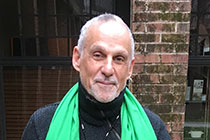Profile
Ken has had a rather circuitous journey to and within academics which brings a particularly complex and poignant understanding of the politics of power and knowledge to his research and community work. Ten years of his life were devoted to sustaining himself as an unskilled, poorly paid labourer in a variety of jobs that made palpable the abuses of capitalism, othering, and the the reality of promethean shame. All the while, he was an activist in the civil rights and anti-war movements that were so vital during the 60s and beyond. At one point, a short stint at an alternative school allowed for extended conversations with Buckminster Fuller and Marshall McLuhan as well as the milieu of a John Cage “Happening”. He finally succumbed to a proper education and received his undergraduate and graduate degrees from the University of Wisconsin in art and visual culture. Most of his thirty-five years of teaching and scholarship focused on the use of social photography and ethnography as discourses for political and social change. Projects included extensive bodies of images of labourers and eleven years in the coal mining regions of central Appalachia. It was not until the last ten years of his career that he realised just how the authority of seeing and photographic images reified ideologically constructed gazes and their complicity in colonialist endeavours. He cast aside his photographs and ethnographic recordings to teach, conduct research and write about the tropes of visuality and the social construction of identities using a wide-range of contemporary critical theory.
Interests
I have always felt the constraints and frustration of disciplinarily constructed education as proposed by Sylvia Wynter in her texts on the humanising of race in spatial-temporal realms outside of traditional academic genres. It is for this reason that I have found a home in human geography particularly as it is approached at Queen Mary University. Such an approach is embodied in the writings of feminist physicist Karen Barad who combines some of the concepts of Neils Bohr and quantum theory to assert that all aspects of life (and the universe) are already in conversation with one another in intra- (not inter) relationality. While we need, I suppose, to abide by some disciplinary canons and methodologies, we must simultaneously acknowledge that life does not occur within the confined borders of one or even a few disciplines. This is why my current research and just my human interests demand imbricating so many areas of theoretical studies including the following and beyond: Postcolonialism, poststructuralism, structures and disruptions of power and knowledge, feminisms/womanisms, queer theory, centrality of the human body, im/migration and the and visuality, and, of course, human geographies.
Recent Presentations:
- Global Leadership Conference on Gender, London
- International Journal of Arts and Sciences, Feminist and Queer Research Methodologies, Harvard University
- Gender Studies Symposium, Queer Academics, Portland, Oregon
- European Union Conference on Diversity and the Media, London
- Arts in Society Conference, Body Politic: The Fabrication of Identity (clothing and the construction of the body), Budapest, Hungary
- Southeastern College Arts Conference, The Art and Authority of Seeing, North Carolina
- Arts in Society Conference, The Spectacle of Tourism, Liverpool, UK
Exhibitions in the United States include such venues as:
- Pennsylvania Academy of the Fine Arts, Philadelphia Alfred Lowenherz Gallery, New York
- University of Delaware
- Mint Museum, North Carolina Mississippi Museum of Art Light Factory, North Carolina University of Virginia Fairmont State College
- Ackland Museum of Art, North Carolina
- Emory and Henry College, Virginia
Awards and Grants:
- Individual Artist Fellowship, Southern Arts Federation
- North Carolina Arts Council, Individual Artist Grant
- Wisconsin Arts Board and the National Endowment for the Arts (NEA)
